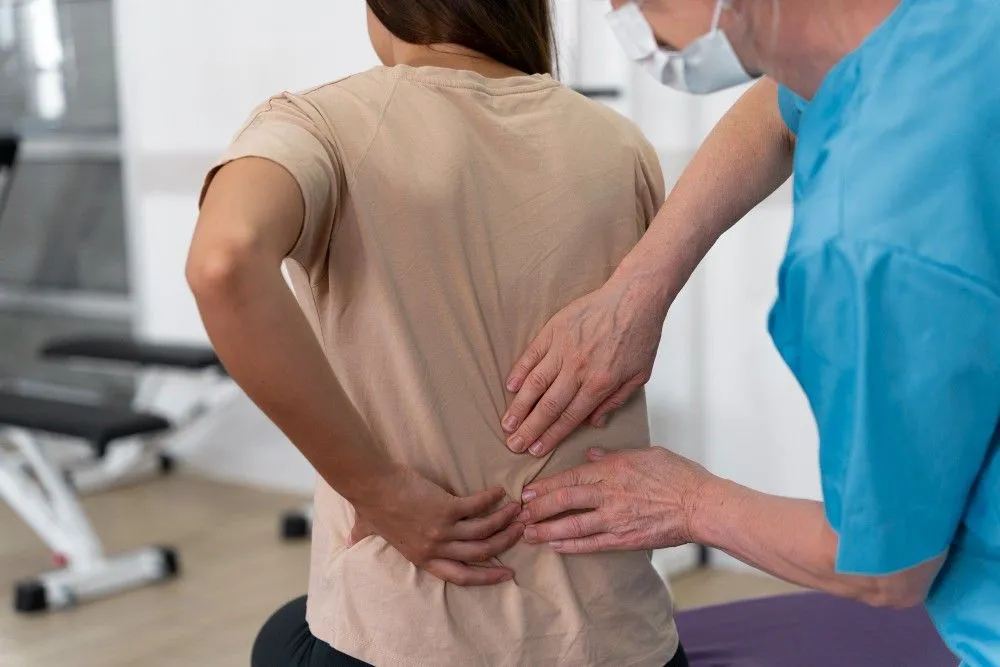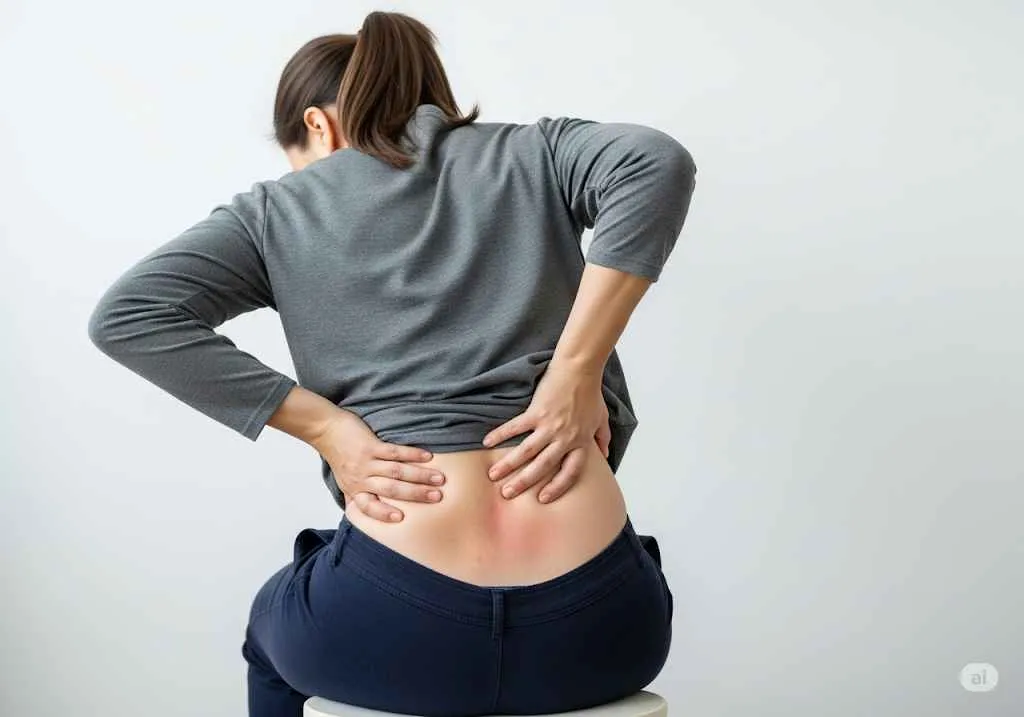When you hear “hernia,” you probably think of a bulge in the abdomen or groin. But what if your back pain is somehow connected? A common question people ask is, “Can a hernia cause back pain?” While not everyone with a hernia experiences back pain, certain types can trigger or worsen it. In this guide, we’ll break down the link between hernias and back pain, symptoms to watch for, home care tips, and when it’s time to see a doctor.
Can a Hernia Cause Back Pain?
If you are wondering, can I get back pain from a hernia? The answer is yes, in certain cases, the hernia can lead to significant back pain, especially if it compresses nearby nerves, changes posture, or leads to muscle strain. This is more common with spinal hernias, inguinal hernias, and hiatal hernias.
However, the intensity or severity of pain depends on the location and type of the hernia. For example, smaller hernias lead to less pain compared to larger ones, while those located especially in the groin area are more uncomfortable than others. Moreover, the pain mostly occurs during strain-induced activities like bending, lifting, and coughing.
How Hernias Affect the Back and Cause Pain
A hernia can indirectly trigger back pain through:
-
Nerve compression: Some hernias may push against nearby nerves and muscles, which stimulate pain signals that radiate to the back and cause referred pain.
-
Poor body posture and movement changes: To manage hernia-related back pain, people might unintentionally adjust their body posture or movement. This, in turn, can put pressure on the back muscles, leading to back pain.
-
Chronic fatigue & muscle tension: An untreated hernia can lead to poor sleep, muscle fatigue, and tension in the lower back area.
How Different Types of Hernias May Contribute to Back Pain?
The location of the hernia can affect the severity and type of the back pain. For instance, inguinal hernias (that occur in the groin area) can lead to referred pain, which can radiate to the back. While spinal hernia can cause localized pain or shooting pain in the back.
Here's the table showing the different forms of back pain depending on the location and type of the hernia:
| Type of Hernia | Common Pain Location | How It Affects the Back |
|---|---|---|
| Abdominal Hernia | Abdomen, referred pain to back | Can strain nearby muscles and affect posture |
| Inguinal Hernia | Groin, radiating to lower back | Pain may shoot to back when coughing or lifting |
| Spinal Hernia | Direct back pain | Disc herniation may compress spinal nerves |
| Hiatal Hernia | Chest, upper back | Acid reflux and diaphragm strain may cause upper back pain |
| Umbilical Hernia | Belly button area, possible back strain | Pressure around the abdomen can affect spine alignment |
What Does Hernia Pain Feel Like?
The type and severity of the hernia pain basically vary from one person to another.
-
However, it is mostly described as a dull pain or pressure in the impacted area.
-
Moreover, you may feel a stabbing or burning sensation or experience a shooting pain.
-
The pain may become worse with physical activities such as coughing, twisting, bending, and lifting, and subside with lying down or taking rest.
Related Read: What does a hernia feel like? Understanding The Sensation
How to Know if Your Back Pain is Caused by a Hernia?
It is not always possible to understand whether a hernia is contributing to back pain. Hence, the best idea is to seek professional guidance. But you can keep a watch on symptoms that may indicate hernia-associated back pain.
Signs Your Back Pain May Be Caused by a Hernia:
-
A visible or tender bulge near the abdomen or groin while coughing or straining indicates an abdominal hernia.
-
Pain, numbness, or tingling sensations radiating from the lower back to the legs, indicating a spinal hernia or a herniated disc.
-
Back pain worsens with movements, like bending, standing, or lifting, and improves with rest.
-
Dull ache or feeling of strain, and sometimes sharp or shooting pain.
-
Nausea, vomiting, or poor bowel movement, indicating hernia-related complications, like strangulation, which need instant medical treatment.
- Pain improves with rest or lying down
Best Home Remedies to Relieve Hernia-Related Back Pain
These simple home remedies can be helpful for mild hernia-related back pain:
1. Take rest and don't engage in stressful activities:
-
Do not practice stressful activities, particularly bending or lifting, as they tend to increase the pain.
-
Take rest to reduce pressure on the affected area, which supports the healing process.
2. Try a warm or cold compress:
-
A warm compress can relax back muscles and relieve inflammation, which reduces back pain.
-
On the other hand, a cold compress can numb the affected area and reduce swelling.
-
Apply a heating pad or an ice pack to the impacted area for around 10-15 minutes. Repeat it several times per day.
3. Take pain-relieving medications:
-
Take over-the-counter (OTC) pain relievers, such as ibuprofen or naproxen sodium, to help reduce hernia-related back pain.
-
They block the pain signals, which prevent them from reaching the brain and causing inflammation, which contributes to back pain.
-
Take the medicine as advised on the label and always discuss your medical conditions and current medicines with a doctor.
4. Wear supportive garments:
-
Wear supportive garments like a belt or brace, which can reduce pain and discomfort and provide stability to the affected area.
-
They work by applying gentle pressure to the affected area, which keeps the hernia in place and prevents it from coming out.
5. Physical therapy:
-
Practicing physical therapy for hernia, such as pelvic tilts, deep breathing exercises, and bridge poses under the supervision of a certified therapist, can help strengthen the affected muscles, reduce pain, and enhance flexibility.
-
These exercises help stabilize the spine and provide support to the injured area.
6. Maintain proper posture and practice body mechanics:
-
Help prevent pressure on the back and supports better spinal alignment, which relieves hernia-associated back pain.
-
Avoid hunching or sitting in one place for a longer period, and use correct lifting strategies, which can reduce pressure on the affected area, thus relieving pain and discomfort.
When to See a Doctor?
You should consult a healthcare professional if you suspect hernia-related back pain, especially if you experience:
-
Persistent, severe, or worsening back pain
-
Radiating pain from the back to other body parts
-
A noticeable lump or swelling in the groin or abdominal area
-
Changes in bowel movements
-
Numbness, tingling sensation, or weakness in the legs
-
Urinary incontinence or retention
-
Difficulty breathing or swallowing
-
Racing heart rate
-
Nausea, vomiting, and fever
Professional Treatment Options for Hernia-Related Back Pain
In some cases, back pain related to a hernia can be relieved using pain medications, rest, and physical therapies. But, when pain persists or becomes worse, or a hernia is large and causes strangulation, doctors recommend the following surgeries:
Open Hernia Repair:
-
Involves making an incision (cut) near the hernia area to gently push back the bulging tissue into the original place and hold up the weak muscle area with a synthetic mesh or stitches.
-
Recovery can vary depending on the type and severity of back pain, but people often get relief from the pain immediately after the surgery.
Laparoscopic Hernia Repair:
-
Involves making many tiny incisions (cuts) through which surgical instruments and a laparoscope are inserted, which help fix the hernia internally using a synthetic mesh.
-
Results in less pain, shorter recovery, and quicker return to everyday activities compared to open hernia repair surgery.
Related Read: Hernia Repair Surgery: FAQ
Can Hernia-Associated Back Pain Cause Other Health Problems?
If left untreated, hernia-related back pain can lead to many health problems:
-
By limiting physical activities, the pain can lead to reduced mobility and pressure on the back muscles.
-
This lack of movement can lead to poor posture, which contributes to strain and nerve irritation on the spine, causing more discomfort.
-
Over time, bad body posture can strain the spine, which can lead to a high risk of herniated or slipped discs.
-
Moreover, research shows that hernia pain can contribute to poor movement habits, which, as a result, cause joint stress and muscle imbalance.
-
This, in turn, can lead to an increased risk of sprains, strains, or fractures, particularly in the legs and back.
-
In addition, according to a study, chronic lower back pain can affect your mental health, which can cause anxiety, depression, fear, and anger.
Final Thoughts
So, can a hernia cause back pain? While not all hernias cause back pain, certain types, especially if left untreated, can lead to muscle strain, nerve compression, and poor posture. If you're dealing with unexplained back discomfort along with a bulge or abdominal strain, don’t ignore it. Speak with a healthcare provider for a proper diagnosis. Early treatment can prevent complications and help you return to pain-free movement sooner.
अक्सर पूछे जाने वाले प्रश्नों
How to get instant relief from hernia pain?
Apply a cold compress, take OTC pain relievers, lie down flat, avoid trigger foods (in case of hiatal hernia), and wear hernia belts or trusses to quickly manage pain.
What position relieves hernia pain?
Lying down flat on the back can reduce hernia-related pain by allowing the protruding tissue to move back to the abdominal cavity.
Where is hiatal hernia-related pain located in a woman?
It is located in the upper abdominal area, near the diaphragm. In addition, it can move to the chest, back, throat, and neck, causing symptoms like heartburn, pain between the shoulder blades, difficulty swallowing, and a tight or sore throat.
Is it possible for a hernia to lead to sciatica pain?
Yes, it can lead to sciatic pain that travels along the sciatic nerve, generally from the lower back area to the legs.
Can an abdominal hernia lead to back pain?
Yes, by putting strain on the abdominal wall and nearby nerves and muscles, an abdominal hernia can lead to lower back pain.
लेखक





